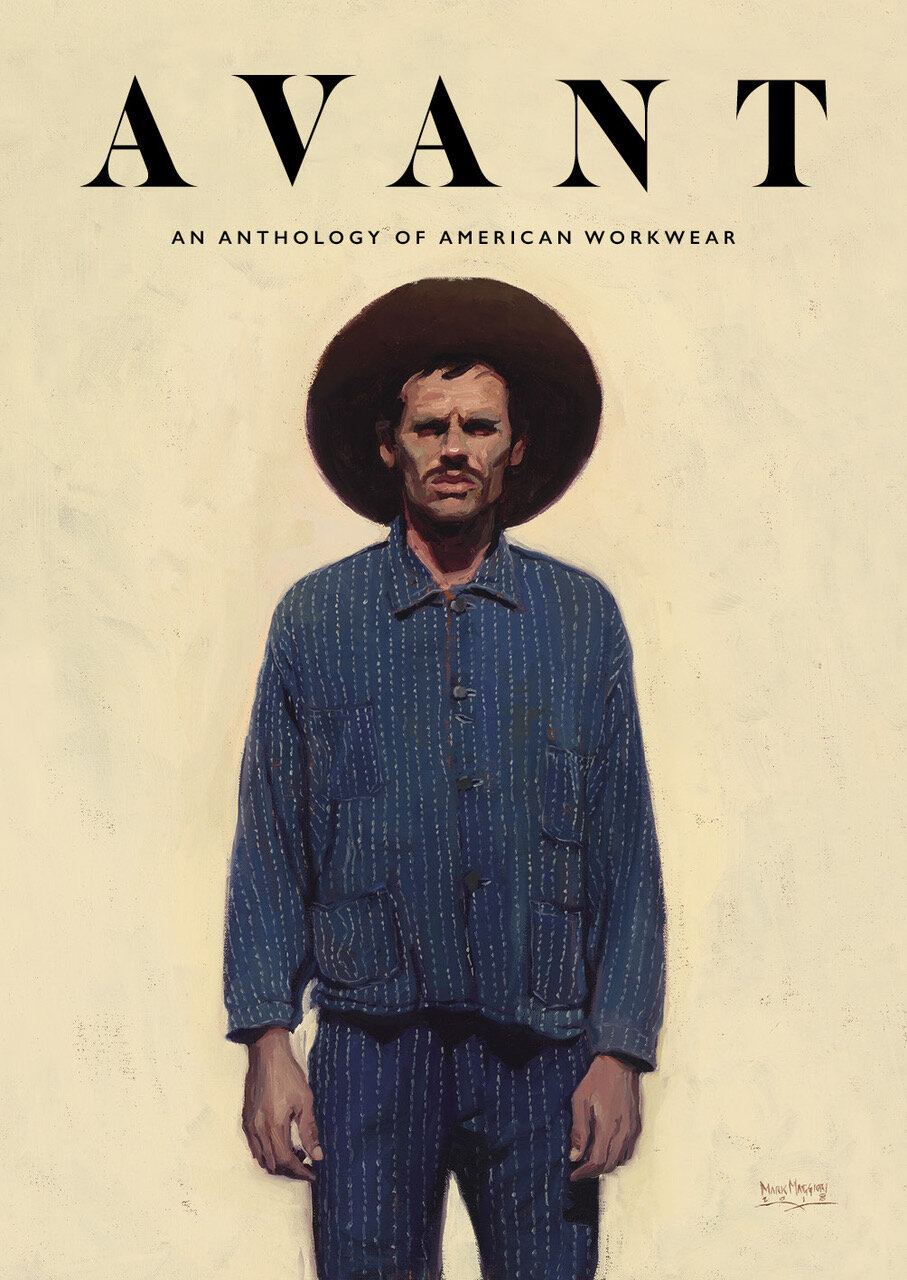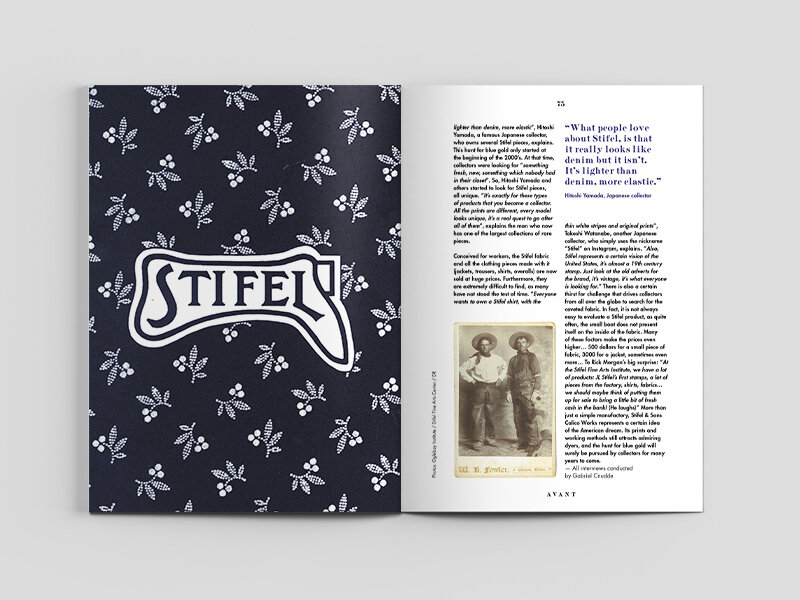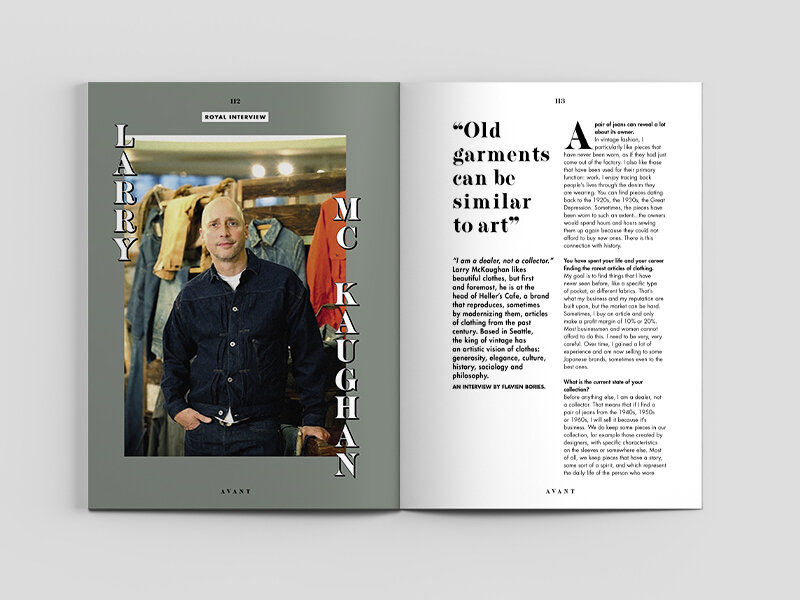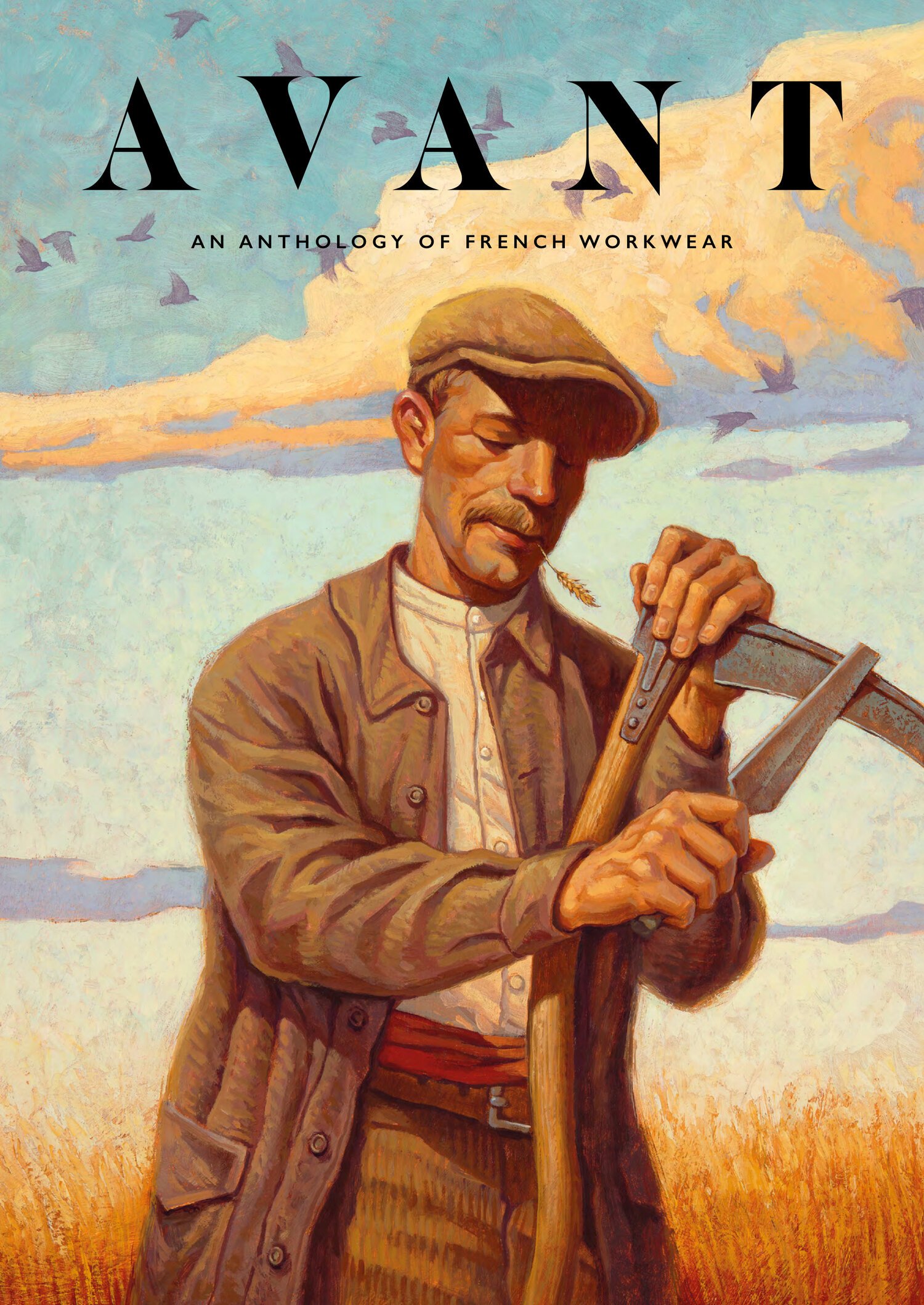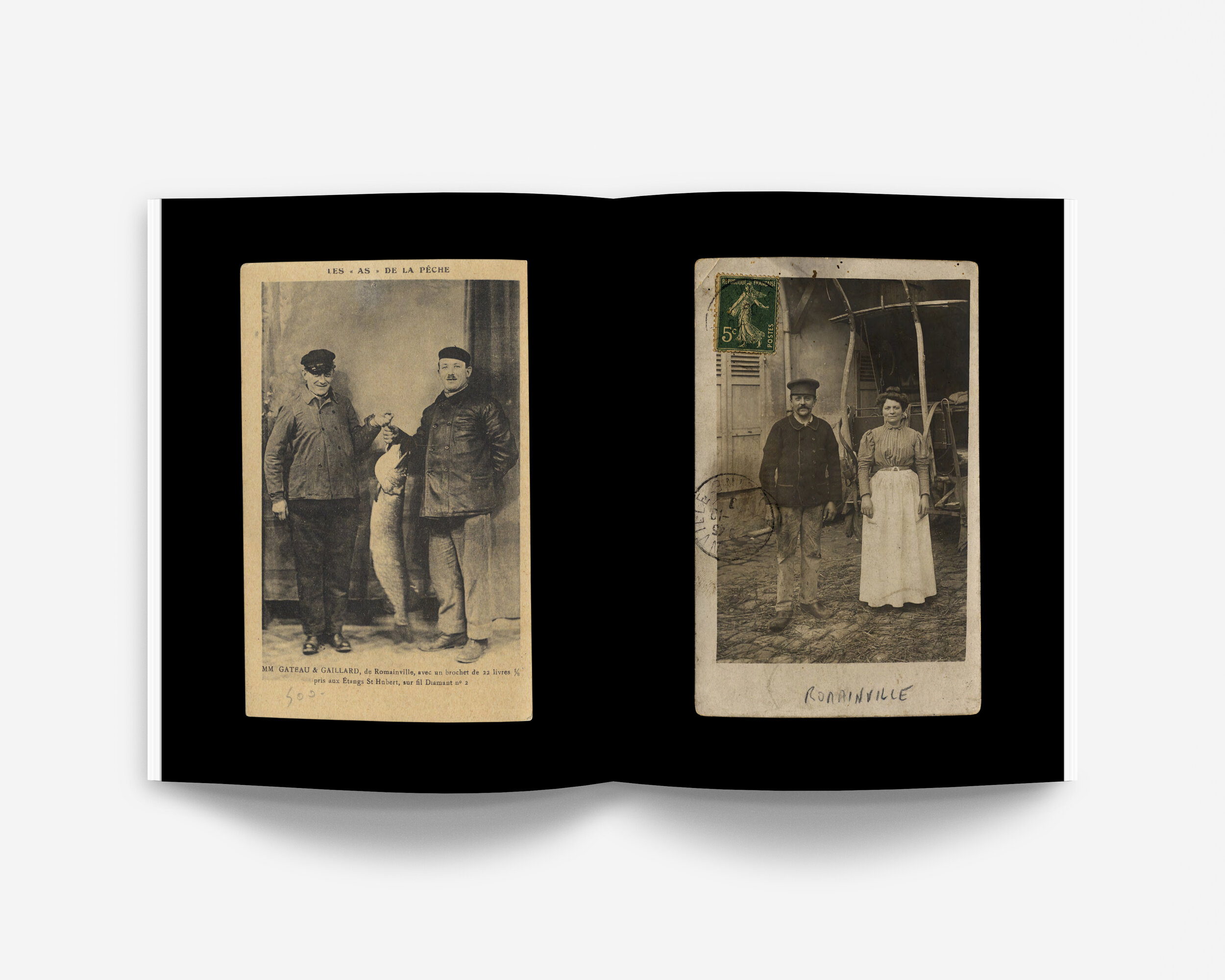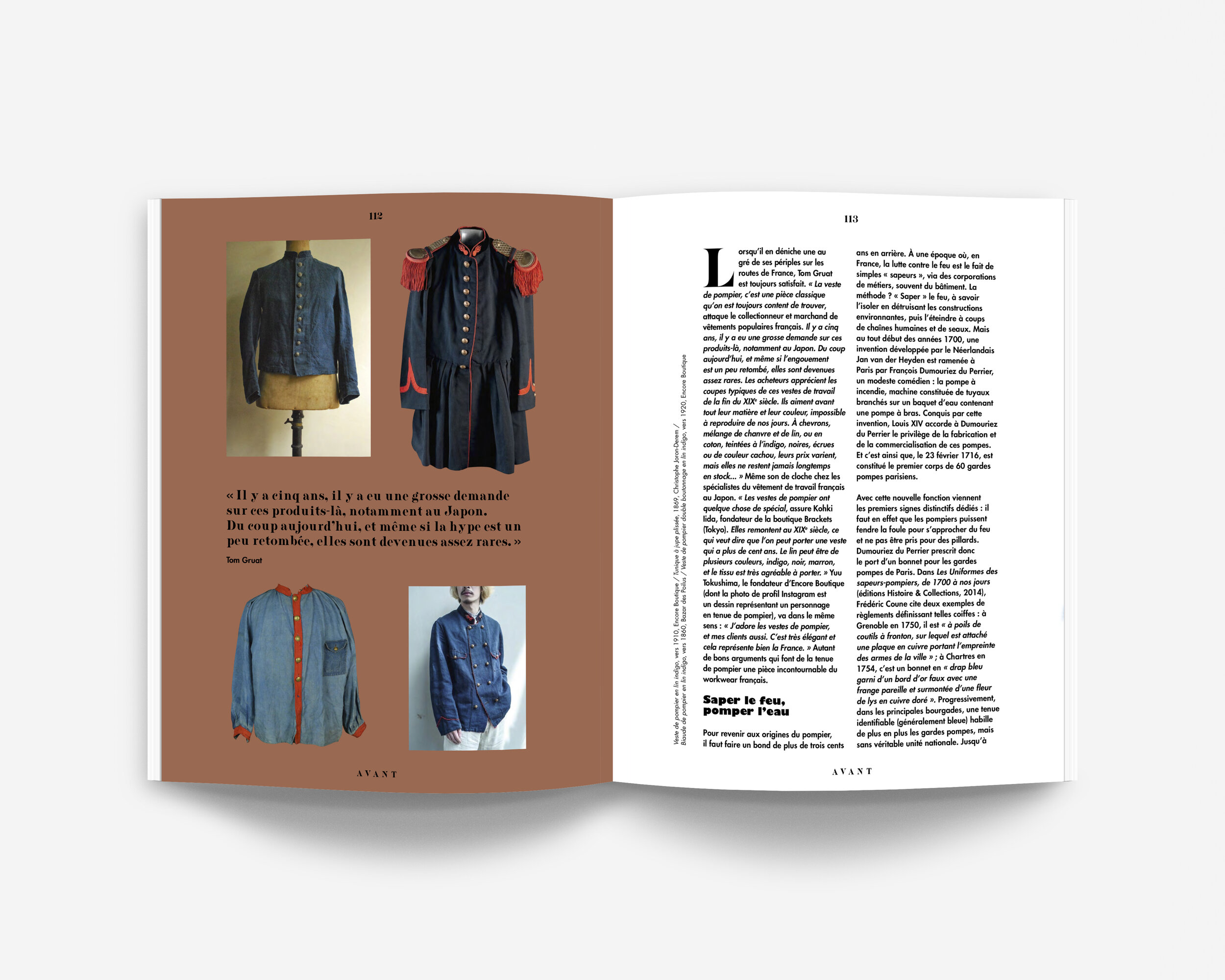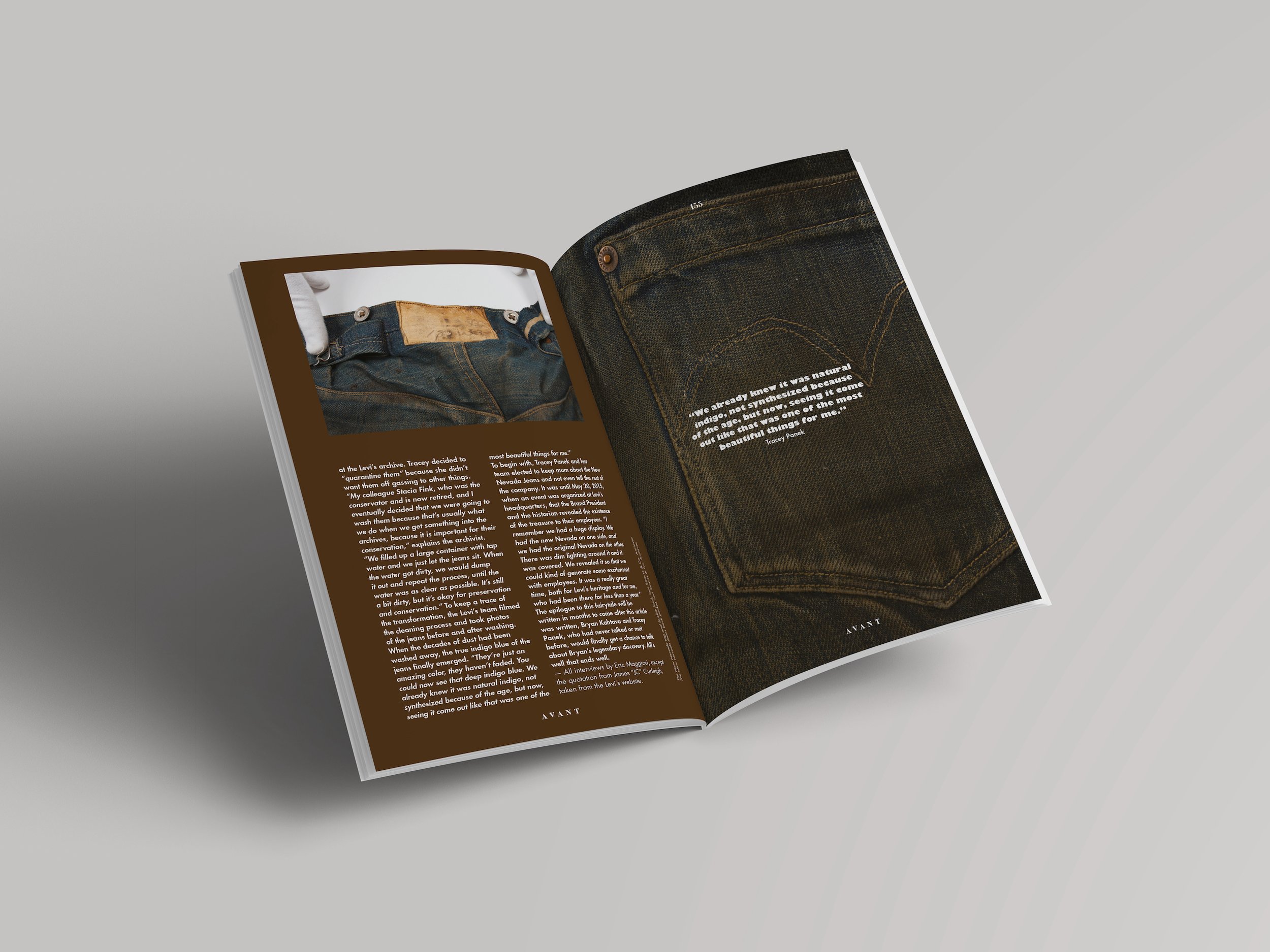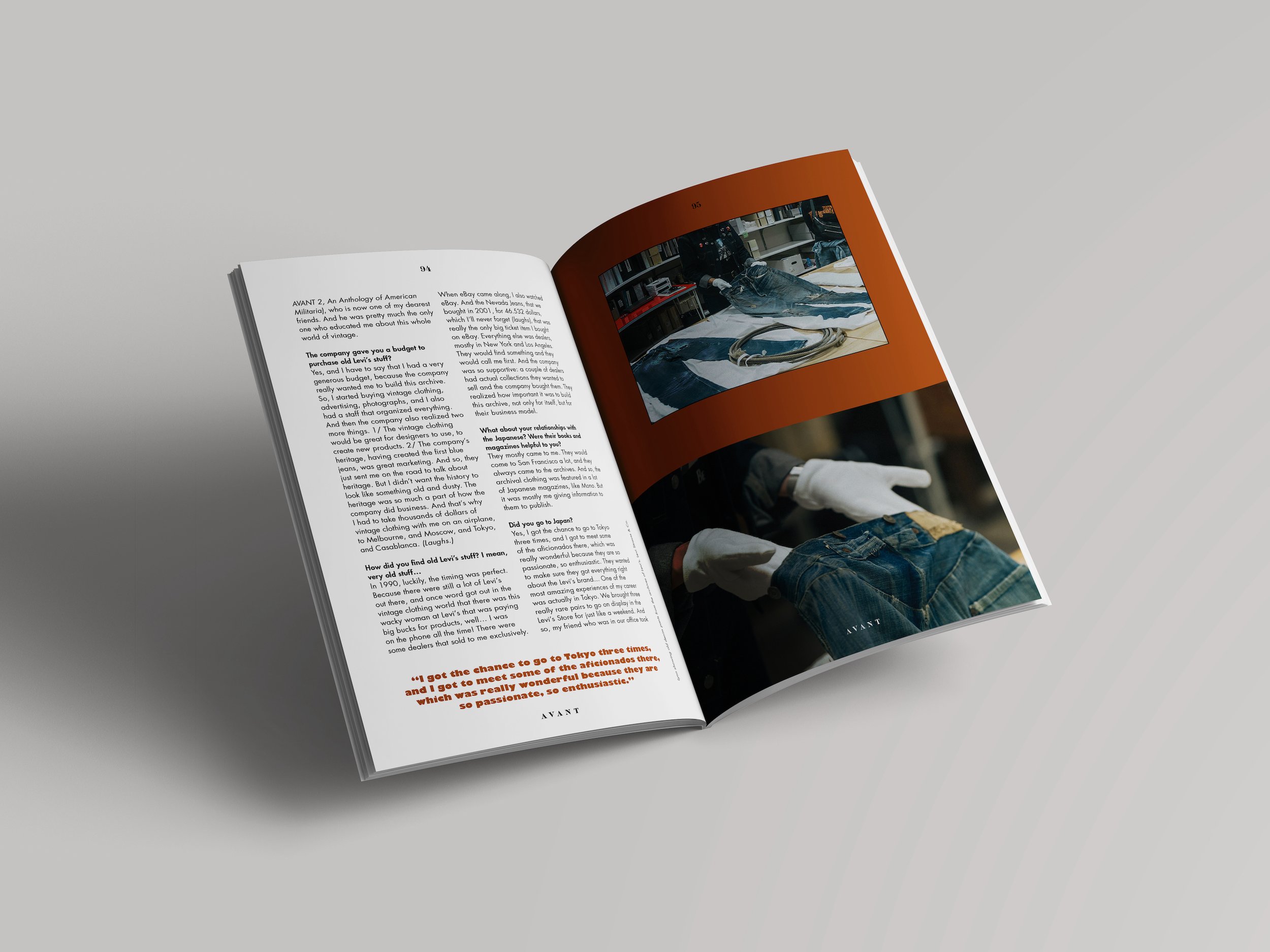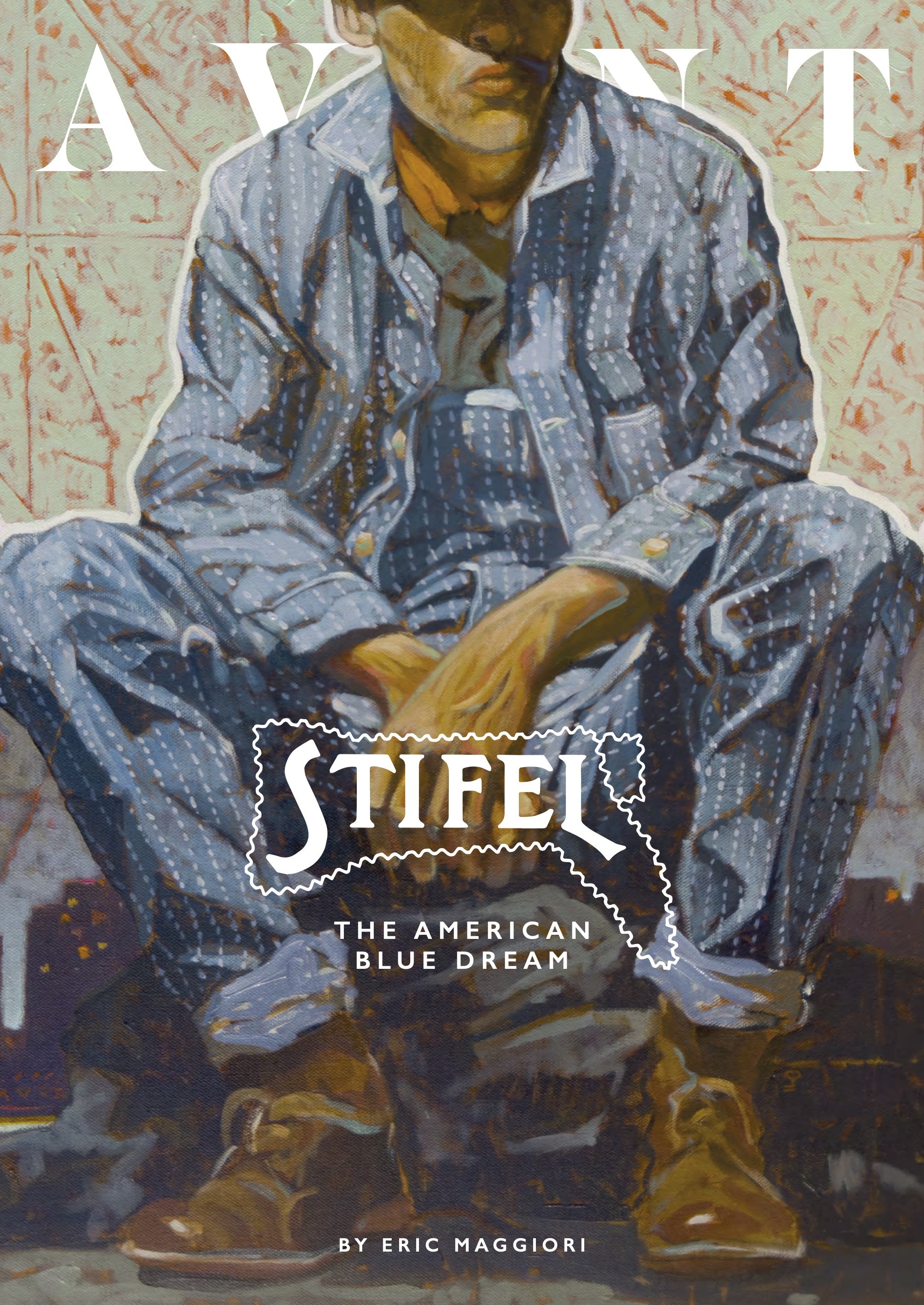 Image 1 of 9
Image 1 of 9

 Image 2 of 9
Image 2 of 9

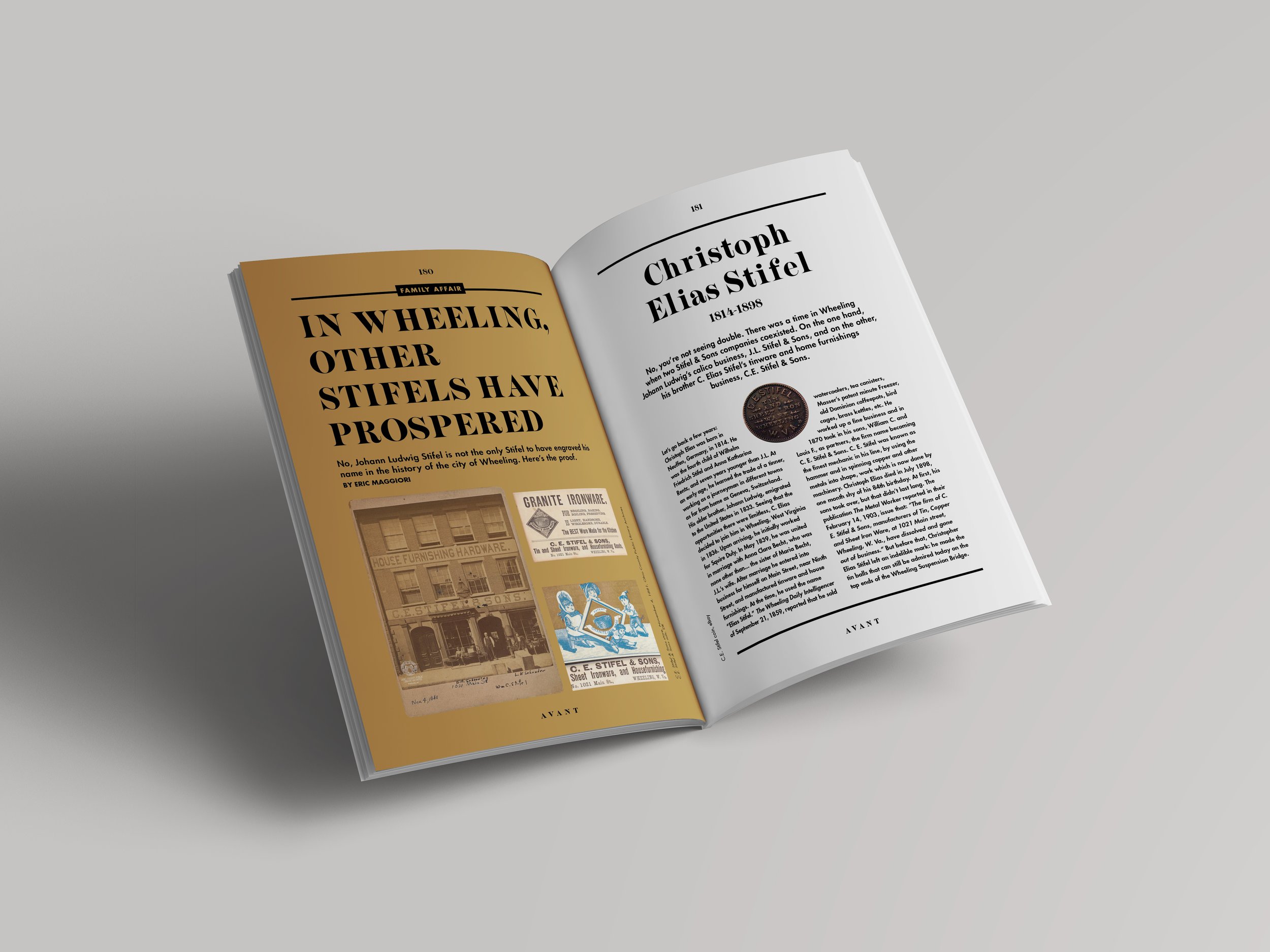 Image 3 of 9
Image 3 of 9

 Image 4 of 9
Image 4 of 9

 Image 5 of 9
Image 5 of 9

 Image 6 of 9
Image 6 of 9

 Image 7 of 9
Image 7 of 9

 Image 8 of 9
Image 8 of 9

 Image 9 of 9
Image 9 of 9










Stifel, The American Blue Dream
After five anthologies dedicated to workwear, military and western wear, AVANT devotes its sixth issue to the brand that makes collectors the world over dream: Stifel.
In this book, the first ever published on Stifel, we tell you about the life and legacy of the Stifel family, who for over 100 years produced the finest calico fabrics in the United States.
Today, workwear made with Stifel wabash fabrics is considered the Holy Grail. These blue fabrics with white polka dots, stamped with the boot symbol, fetch a premium on the vintage clothing market. Why are they so fascinating? Why have they become so valuable?
We tried to answer these questions by interviewing all those who are fascinated by Stifel in one way or another: collectors, historians, fabric specialists, vintage dealers, and even the descendants of the Stifel family.
We spoke to Joan Stamp, great-granddaughter of company founder Johann Ludwig Stifel, as well as historians Dave Javersak and Terry Terrell, collectors Bryan Shettig, Takeshi Watanabe, Akira Tsuchida, Bryan Lin, Kinji Teramoto and many others.
Even Mike Wolf, star host of the TV show American Pickers, who himself owns a rare pair of Stifel overalls, gave us his opinion on this brand.
Every page of this book makes us realize just how much the will of one man, who left home to pursue his dream, changed the destiny of an entire family, an entire industry, and continues to have an impact almost two centuries later.
STIFEL HISTORY
• Johann Ludwig Stifel’s Incredible Destiny : At the age of 26, J.L. Stifel departed from a small German village to pursue his American dream in Wheeling, West Virginia.
• Life After J.L. : The success of J.L. Stifel & Sons didn’t end with the death of its founding father. Three different generations managed the company for over 70 years.
• One Boot to Rule Them All : It’s a little logo that makes collectors all over the world fantasize: the Stifel boot. How, when, and why was it introduced?.
• How Did Stifel Produce Its Fabrics? : To obtain its unique wabash fabric, the Stifels had developed an extremely meticulous, multi-step manufacturing process.
• Stifel’s Customers List : Thanks to the archiving and research work carried out by collectors, vintage dealers, and enthusiasts, we have been able to draw up a (non-exhaustive) list of the brands that collaborated with Stifel.
• In Wheeling, Other Stifels Have Prospered : No, J.L. Stifel is not the only Stifel to have engraved his name in the history of the city of Wheeling.
• St. Louis: The Stifel Family’s Other Stronghold : Another city became the new home for a portion of the Stifel family, a place where they’d go on to build successful businesses: St. Louis, Missouri.
COLLECTORS
• Cory Piehowicz : He collects antique photographs and RPPC of workers and is particularly keen on those showing them wearing Stifel garments.
• The Stifel Exhibition : Nine lucky collectors have agreed to share a Stifel garment from their personal collection.
• My Stifel Archive, by Eric Maggiori : Founder of AVANTn Eric Maggiori hasI been collecting Stifel clothes for twelve years now. He introduces his personal collection in this book.
• Interview with Takeshi Watanabe : When Takeshi Watanabe signed up for Instagram in 2011 and the app asked him to choose a username, he picked “Stifel.” And he’s still the only one with this privilege.
FABRIC SECRETS
• The Roots of Indigo : To produce his fabric, J.L. Stifel needed cotton and indigo. While we all know where cotton comes from, the source of natural indigo is far less obvious.
• The Origins of Calico : What do we really know about calico? Where does it come from? And why is it called that?
• Why Is It Called ‘Wabash Fabric?’ : The word has entered the vintage lexicon: Wabash. What is the origin of this name? And how does it differ from calico?
• The Art of Repairing Wabash : Kanae Kato is probably the best seamstress in the world at repairing wabash garments. We asked her to repair a pair of overalls.
AND MORE…
• Seven things you don’t know about Stifel
• The Wabash Buddy Lee
• The most popular Stifel patterns
• The American Worker, a painting by S.M. Chavez
After five anthologies dedicated to workwear, military and western wear, AVANT devotes its sixth issue to the brand that makes collectors the world over dream: Stifel.
In this book, the first ever published on Stifel, we tell you about the life and legacy of the Stifel family, who for over 100 years produced the finest calico fabrics in the United States.
Today, workwear made with Stifel wabash fabrics is considered the Holy Grail. These blue fabrics with white polka dots, stamped with the boot symbol, fetch a premium on the vintage clothing market. Why are they so fascinating? Why have they become so valuable?
We tried to answer these questions by interviewing all those who are fascinated by Stifel in one way or another: collectors, historians, fabric specialists, vintage dealers, and even the descendants of the Stifel family.
We spoke to Joan Stamp, great-granddaughter of company founder Johann Ludwig Stifel, as well as historians Dave Javersak and Terry Terrell, collectors Bryan Shettig, Takeshi Watanabe, Akira Tsuchida, Bryan Lin, Kinji Teramoto and many others.
Even Mike Wolf, star host of the TV show American Pickers, who himself owns a rare pair of Stifel overalls, gave us his opinion on this brand.
Every page of this book makes us realize just how much the will of one man, who left home to pursue his dream, changed the destiny of an entire family, an entire industry, and continues to have an impact almost two centuries later.
STIFEL HISTORY
• Johann Ludwig Stifel’s Incredible Destiny : At the age of 26, J.L. Stifel departed from a small German village to pursue his American dream in Wheeling, West Virginia.
• Life After J.L. : The success of J.L. Stifel & Sons didn’t end with the death of its founding father. Three different generations managed the company for over 70 years.
• One Boot to Rule Them All : It’s a little logo that makes collectors all over the world fantasize: the Stifel boot. How, when, and why was it introduced?.
• How Did Stifel Produce Its Fabrics? : To obtain its unique wabash fabric, the Stifels had developed an extremely meticulous, multi-step manufacturing process.
• Stifel’s Customers List : Thanks to the archiving and research work carried out by collectors, vintage dealers, and enthusiasts, we have been able to draw up a (non-exhaustive) list of the brands that collaborated with Stifel.
• In Wheeling, Other Stifels Have Prospered : No, J.L. Stifel is not the only Stifel to have engraved his name in the history of the city of Wheeling.
• St. Louis: The Stifel Family’s Other Stronghold : Another city became the new home for a portion of the Stifel family, a place where they’d go on to build successful businesses: St. Louis, Missouri.
COLLECTORS
• Cory Piehowicz : He collects antique photographs and RPPC of workers and is particularly keen on those showing them wearing Stifel garments.
• The Stifel Exhibition : Nine lucky collectors have agreed to share a Stifel garment from their personal collection.
• My Stifel Archive, by Eric Maggiori : Founder of AVANTn Eric Maggiori hasI been collecting Stifel clothes for twelve years now. He introduces his personal collection in this book.
• Interview with Takeshi Watanabe : When Takeshi Watanabe signed up for Instagram in 2011 and the app asked him to choose a username, he picked “Stifel.” And he’s still the only one with this privilege.
FABRIC SECRETS
• The Roots of Indigo : To produce his fabric, J.L. Stifel needed cotton and indigo. While we all know where cotton comes from, the source of natural indigo is far less obvious.
• The Origins of Calico : What do we really know about calico? Where does it come from? And why is it called that?
• Why Is It Called ‘Wabash Fabric?’ : The word has entered the vintage lexicon: Wabash. What is the origin of this name? And how does it differ from calico?
• The Art of Repairing Wabash : Kanae Kato is probably the best seamstress in the world at repairing wabash garments. We asked her to repair a pair of overalls.
AND MORE…
• Seven things you don’t know about Stifel
• The Wabash Buddy Lee
• The most popular Stifel patterns
• The American Worker, a painting by S.M. Chavez



